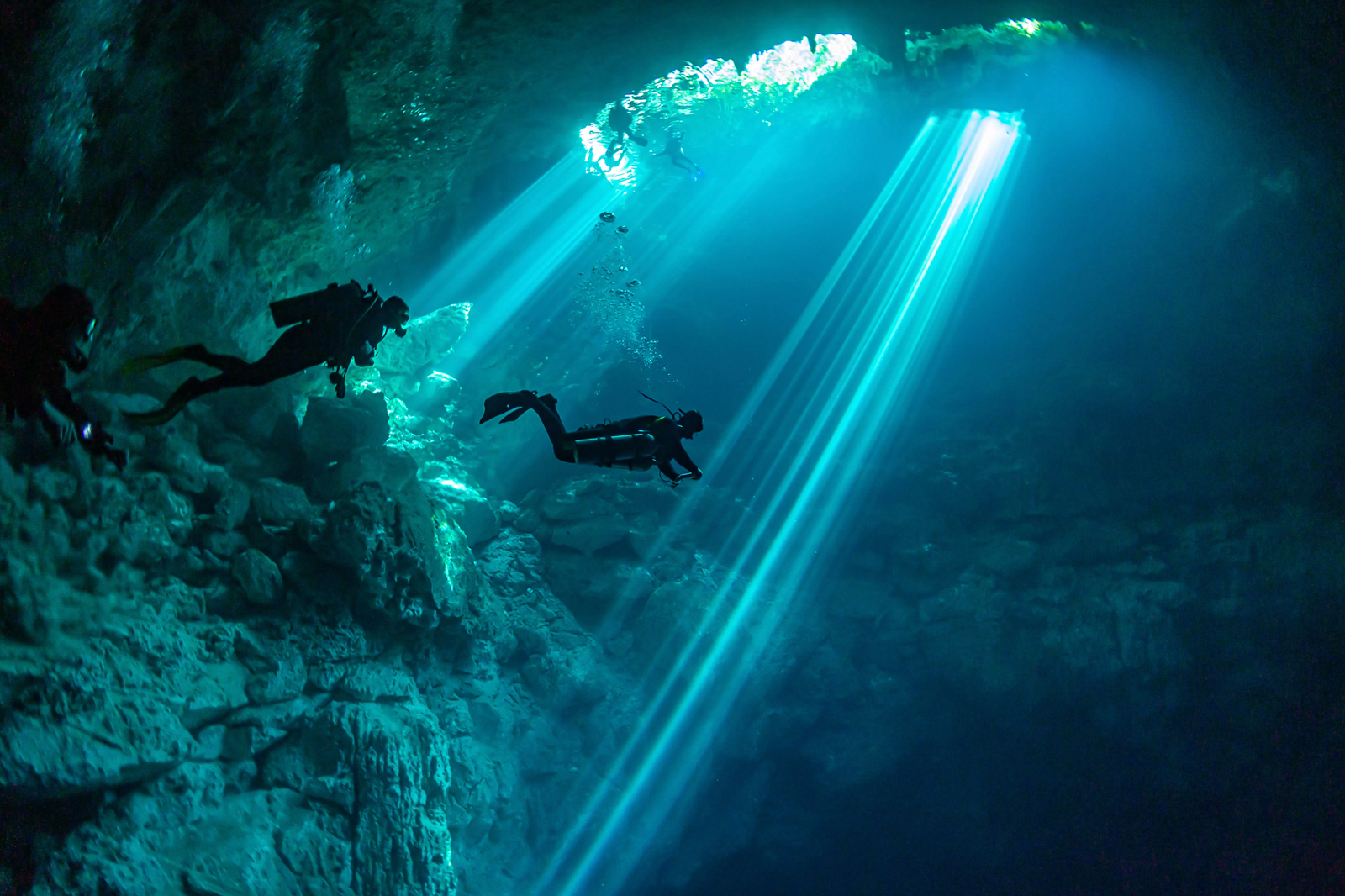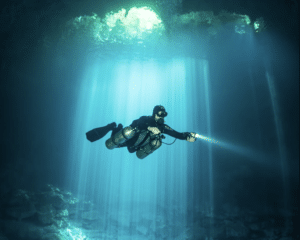It is normal to have some worries or anxieties about the idea of cenote diving for the first time. But cenotes offer a unique and mesmerizing world to explore, hidden beneath the surface.
Cenote diving is an amazing way to experience the beauty and mystery of these natural sinkholes, but many people avoid trying it because they fear the worst might happen to them. The chances of something bad happening to you underwater are actually extremely low. Dark, tight spaces are not waiting to trap you at every turn… we promise!
We are going to put your mind at ease and talk about the following 8 common worries of first-time cenote divers.
1. Running out of air
This is probably the number one fear that people have about cenote diving. But it is extremely unlikely to happen. When you sign up for a cenote diving course or a try dive, one of the first practical skills that you learn is how to check how much air is in your tank as you dive.
A full tank of air will usually last a diver at least 40 minutes but could even last over one hour. Another thing you learn is that divers never end the dive with an empty tank; we always finish with a little left over, to make absolutely sure we will not run out in the final minutes.
Certified divers are in charge of checking their own air gauge when diving, however, the dive guide or instructor will keep reminding you to check also. So there is really no reason to ever run out of air when cenote diving.
2. Cave Creatures
The idea of encountering cave creatures might be daunting. However, cenotes are generally home to small fish and harmless aquatic life. Larger, potentially intimidating creatures are not part of the cenote ecosystem. These environments are more about stunning rock formations and crystal-clear waters than wildlife encounters.
3. Decompression sickness
Decompression sickness, or “the bends,” as you might have heard it be called, is a condition that can occur if a diver comes to the surface too fast or stays too deep for too long. But this is very unlikely to happen to you.
During your Open Water Diver course, you will learn about “no decompression limits,” which tell us how long we can stay at a certain depth before our bodies take on too much nitrogen. It is the high levels of nitrogen that can lead to decompression sickness.
As we start to slowly ascend from a dive, our bodies will “off-gas” this nitrogen, which takes time to do. This is why if we shoot to the surface very fast, we risk getting the bends. However, this only really becomes a risk when you start to dive deep.
When you first try cenote diving, you will not be diving deep enough to risk getting decompression sickness. You should always avoid bolting to the surface very fast, but even if you did, you are still unlikely to experience decompression sickness. Your instructor will not take you deep underwater until they feel you are ready.

4. Getting lost underwater
Another thing you learn during a cenote diving course is how to work as a buddy team. The number one rule of diving is to never dive alone, so we work as buddies to keep each other safe.
This makes it extremely unlikely to ever get separated, but if you ever did, you would have the skills and knowledge to ascend safely and meet your buddy at the surface. If you are thinking of taking part in a try dive, your instructor will be very close to you the whole time, perhaps even holding your hand or tank to make sure you are safe.
5. Not being able to breathe
As discussed above, divers check their air regularly while underwater to make sure they are not going to run out. But maybe you are worried your equipment will fail? Fear not… there are procedures in place for this unlikely scenario, too.
The first thing you should know is that tanks and regulators (the thing you breathe from) are serviced regularly, and every dive school has to follow strict laws to make sure their equipment is safe.
Secondly, you will not only have one regulator to breathe from; every diver also carries a spare regulator which can be used if your primary regulator fails or if your dive buddy runs out of air. They really have thought of everything!
6. Hurting your ears
If you have flown on an airplane, you may have felt how pressure can affect your ears. You will have a similar sensation when descending underwater. Before you head into the water for your first dive, your instructor will make sure that you know how to “equalize” your ears.
This process adds a little air to the inside of your ears and relieves any discomfort. It is quite simple to do; you just hold your nose closed and blow (like blowing into a tissue). You will feel when you need to do this as you dive, but your instructor will also prompt you to make sure you are doing it enough. They will also make sure you are descending very slowly to give you time to equalize your ears successfully.
If you feel intense discomfort or pain, it is important not to go any deeper until that pressure has been equalized. Simply pointing to your ear will let your instructor know if you are having trouble, and they can assist you.
7. Claustrophobia
Cenotes can have narrow passages and enclosed spaces, which might trigger claustrophobia for some divers. However, many cenotes also have wide-open areas and spacious caverns. Your instructor will guide you through the more open sections and ensure you feel comfortable throughout the dive. Gradually, as you gain confidence, you can explore smaller areas at your own pace. Communication with your dive buddy and instructor is key, and they will make sure to address any discomfort immediately.
8. Equipment malfunction
The fear of an equipment malfunction is common, but cenote diving instructors and dive schools prioritize safety and maintenance. Regular checks and servicing of equipment minimize the risk of malfunctions. Additionally, as a diver, you will be trained on how to handle equipment issues, such as clearing a mask or dealing with a free-flowing regulator. Dive guides carry spare equipment, and procedures are in place to handle any unlikely emergencies efficiently. This comprehensive preparation ensures that you can enjoy your dive with peace of mind.
We hope we have eased your mind and you are now considering signing up for a Discover Scuba Diving or even your full Open Water Diver course. Once you hit the water, you will wonder why you waited so long!


